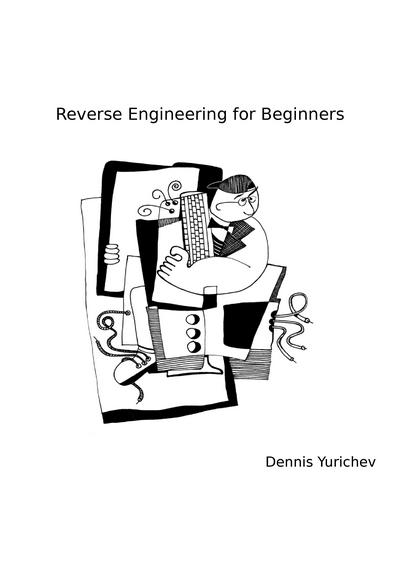
Reverse Engineering for Beginners
This book is about the reverse engineering of softwares as in researching compiled programs. Basic understanding of C/C++ is desirable.
Tag(s): Cryptography
Publication date: 19 Nov 2016
ISBN-10: n/a
ISBN-13: n/a
Paperback: 1052 pages
Views: 11,667
Type: Book
Publisher: n/a
License: Creative Commons Attribution-ShareAlike 4.0 International
Post time: 22 Nov 2016 06:00:00
Reverse Engineering for Beginners
 This book is about the reverse engineering of softwares as in researching compiled programs. Basic understanding of C/C++ is desirable.
This book is about the reverse engineering of softwares as in researching compiled programs. Basic understanding of C/C++ is desirable.
Tag(s):
Cryptography
Publication date: 19 Nov 2016
ISBN-10: n/a
ISBN-13: n/a
Paperback: 1052 pages
Views: 11,667
Document Type: Book
Publisher: n/a
License: Creative Commons Attribution-ShareAlike 4.0 International
Post time: 22 Nov 2016 06:00:00
Publication date: 19 Nov 2016
ISBN-10: n/a
ISBN-13: n/a
Paperback: 1052 pages
Views: 11,667
Document Type: Book
Publisher: n/a
License: Creative Commons Attribution-ShareAlike 4.0 International
Post time: 22 Nov 2016 06:00:00
Summary/Excerpts of (and not a substitute for) the Creative Commons Attribution-ShareAlike 4.0 International:
You are free to:
Share — copy and redistribute the material in any medium or format
Adapt — remix, transform, and build upon the material for any purpose, even commercially.
The licensor cannot revoke these freedoms as long as you follow the license terms.
Click here to read the full license.
Share — copy and redistribute the material in any medium or format
Adapt — remix, transform, and build upon the material for any purpose, even commercially.
The licensor cannot revoke these freedoms as long as you follow the license terms.
Click here to read the full license.
Excerpts from the Preface:
Excerpts from the FAQ:
More Resources:
Dennis Yurichev wrote:There are several popular meanings of the term “reverse engineering”: 1) The reverse engineering of software: researching compiled programs; 2) The scanning of 3D structures and the subsequent digital manipulation required in order to duplicate them; 3) Recreating DBMS5 structure. This book is about the first meaning.
Excerpts from the FAQ:
Dennis Yurichev wrote:Unless you are an OS developer, you probably don’t need to code in assembly—latest compilers (2010s) are much better at performing optimizations than humans.
Also, latest CPUs are very complex devices and assembly knowledge doesn’t really help one to understand their internals.
That being said, there are at least two areas where a good understanding of assembly can be helpful: First and foremost, security/malware research. It is also a good way to gain a better understanding of your compiled code whilst debugging. This book is therefore intended for those who want to understand assembly language rather than to code in it, which is why there are many examples of compiler output contained within.
More Resources:
Tweet
About The Author(s)
Book Categories
Computer Science
Introduction to Computer Science
Introduction to Computer Programming
Algorithms and Data Structures
Artificial Intelligence
Computer Vision
Machine Learning
Neural Networks
Game Development and Multimedia
Data Communication and Networks
Coding Theory
Computer Security
Information Security
Cryptography
Information Theory
Computer Organization and Architecture
Operating Systems
Image Processing
Parallel Computing
Concurrent Programming
Relational Database
Document-oriented Database
Data Mining
Big Data
Data Science
Digital Libraries
Compiler Design and Construction
Functional Programming
Logic Programming
Object Oriented Programming
Formal Methods
Software Engineering
Agile Software Development
Information Systems
Geographic Information System (GIS)
Mathematics
Mathematics
Algebra
Abstract Algebra
Linear Algebra
Number Theory
Numerical Methods
Precalculus
Calculus
Differential Equations
Category Theory
Proofs
Discrete Mathematics
Theory of Computation
Graph Theory
Real Analysis
Complex Analysis
Probability
Statistics
Game Theory
Queueing Theory
Operations Research
Computer Aided Mathematics
Supporting Fields
Web Design and Development
Mobile App Design and Development
System Administration
Cloud Computing
Electric Circuits
Embedded System
Signal Processing
Integration and Automation
Network Science
Project Management
Operating System
Programming/Scripting
Ada
Assembly
C / C++
Common Lisp
Forth
Java
JavaScript
Lua
Rexx
Microsoft .NET
Perl
PHP
R
Python
Rebol
Ruby
Scheme
Tcl/Tk
Miscellaneous
Sponsors
